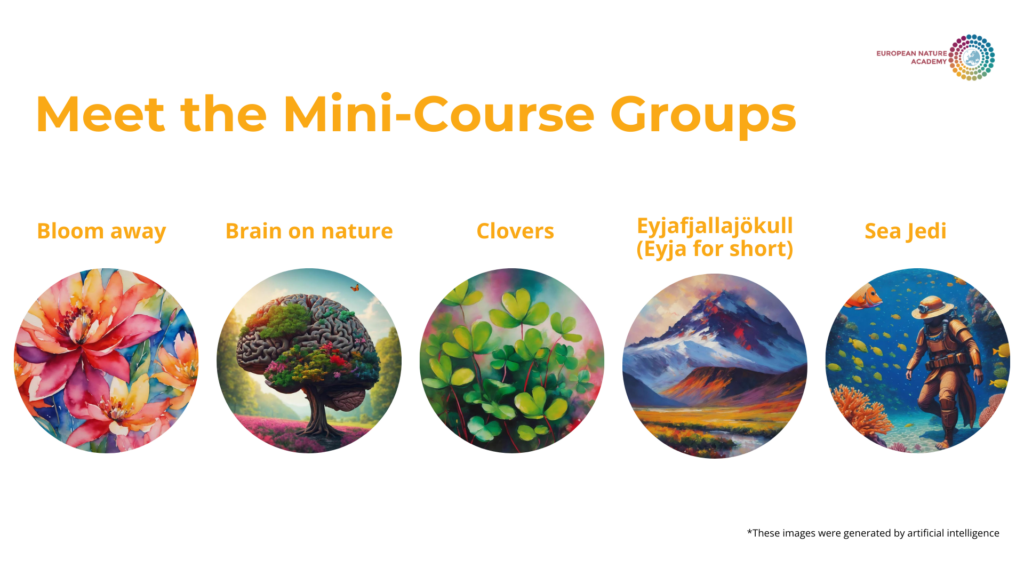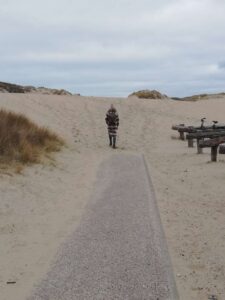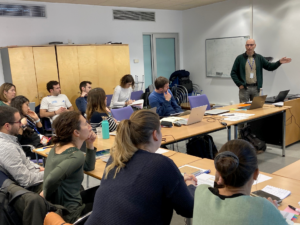European Nature Academy Mini-Courses have started!
The courses will run February to March 2024
The time has come!
The second European Nature Academy intake has officially started their learning journeys with the Online Induction Seminar.
A total of 107 Participants from more than 30 Countries got together to meet, collaborate and get familiar with the Mini Course Programme, as well as their Trainers.
Based on their professional backgrounds, skills and interests indicated during the application process, selected participants have been organised in five European Nature Academy “Houses” – these focus on competence-based applied learning for marine and forest ecosystems, core communication skills, inclusive stakeholder engagement and governance, policy frameworks and more.

ENA Mini-Course Houses
We are incredibly proud and happy that ENA’s Trainee Trainers have this opportunity to share the knowledge they gained during the first round of courses. They will work together with the new intake of participants and we wish them every success during their ENA journey!
Master’s Programme Management of Conservation Areas: Applications Now Open!
Lake Weissensee in Carinthia © FH Kärnten, CUAS
The prestigious “Management of Conservation Areas (MCA)” master degree programme is now open for applications again at Carinthia University of Applied Science in Austria. Starting September 2024, 22 coveted openings are available for students worldwide. This successful programme promises inspiring learning experiences in 21st-century nature conservation. EUROPARC is a long-standing member of the Advisory Board of the Master’s programme.
About the Master Programme
Conservation areas, such as national parks, heritage sites and biosphere reserves, represent Earth’s most beautiful and valuable landscapes. In this international master degree program, students learn to effectively plan and manage such areas, harmonizing biodiversity protection with local interests. The curriculum imparts extensive expertise and diverse personal and technical skills.
Most students already have years of experience in the sector, whether in park management, administration, NGOs, or consulting firms. Through engagement with international peers, outstanding trainers, teachers, and researchers, students reflect on, and develop their experiences. This allows graduates to apply acquired skills to exciting career paths.
The programme, offered at the UNESCO Chair for Conservation Area Management at Carinthia University of Applied Sciences, emphasizes applied research and technology. Close collaboration with UNESCO, international conventions, institutions, universities, and various conservation areas ensures a cutting-edge curriculum. The concept of research-based teaching provides students with the latest scientific insights.
Tailored to the needs of international professionals, the programme blends intensive on-site courses, including visits to various conservation areas, with flexible online elements.
Further information about the programme and registration can be found on the webpage here.
Take the opportunity to find out more about the MCA in a personal discussion with the scientific director, CUAS Prof. Dr Michael Jungmeier. The virtual info sessions will take place on:
- Tuesday, 27th February, 05.00 PM CET ONLINE via MS Teams
- Tuesday, 19th March, 05.00 PM CET ONLINE via MS Teams
- Tuesday, 23rd April, 05.00 PM CET ONLINE via MS Teams
- Tuesday, 28th May, 05.00 PM CET ONLINE via MS Teams
- Tuesday, 25th June, 05.00 PM CET ONLINE via MS Teams
Please register for this by emailing Melina Hierländer:

You can also follow the UNESCO Chair on Sustainable Management of Conservation Areas on LinkedIn here.
New EUROPARC Podcast on Dynamic Dune management in The Netherlands!
In this podcast, EUROPARC’s Communciations Manager Esther Bossink is joined by Myrthe Fonck of PWN. Together they explore an innovative project in The Netherlands that revitalised the dune landscape in National Park Zuid-Kennemerland, The Netherlands. The podcast was recorded end of 2023.
Making dunes mobile again!

Myrthe Fonck on a sand covered bicycle lane, Zuid-Kennemerland. By Neil McIntosh
Over 10 years ago, the Dutch Dune Revival project set out to bring natural dynamics back into the dunes. These coastal areas in The Netherlands are unique. Typically, the dunes are very broad and stretch almost along the entire coastal line. Furthermore, the Dutch dunes are of great importance for the grey dune habitat — also on a European scale.
However, as the main function of dunes became coastal defence, dunes were ‘fixed’ by the planting of marram grass. This prevented wind, sand, and salt to shape the dunes and create dynamic, natural processes. As a result, the dune areas degraded and biodiversity suffered.
So, how to solve this in a country that has 26% of its land located below sea level, without risking the coastal safety? Ecologists in National Park Zuid-Kennemerland came up with a seemingly contradictory plan: create five large openings within the first row of dunes. Opening up the dunes this way allowed sand to blow into the dune system and allowed for natural processes to take place again and rejuvenate the area.
Over 10 years later, the results are in: healthy, resilient and ‘moving’ dunes, where biodiversity thrives. Recreating these natural processes even helped combat the nitrogen deposition in the area, which is one of the main threats to nature in The Netherlands.
Learn more about this Nature-based Solution where different actors came together to create a better result for nature and for people, in this new episode of EUROPARC’s podcast “Voices from the Parks”.
You can also find us on Spotify!
Future-proofing the Dutch dune area
In National Park Zuid-Kennermerland, PWN strives to create natural spaces that are future-proof. The dynamic dune management improves biodiversity, but also supports the area in adapting to climate change. If you want to learn more about climate change adaptation s methods in the Dutch dunes, check out this Climate Talks episode, created within the LIFE Natur’Adapt project.
 EUROPARC Podcasts ‘Voices from the Parks’ is funded by the European Union. Views and opinions expressed are however those of the author(s) only and do not necessarily reflect those of the European Union or CINEA. Neither the European Union nor CINEA can be held responsible for them.
EUROPARC Podcasts ‘Voices from the Parks’ is funded by the European Union. Views and opinions expressed are however those of the author(s) only and do not necessarily reflect those of the European Union or CINEA. Neither the European Union nor CINEA can be held responsible for them.
MPA4Change – supporting the adaptation of Marine Protected Areas to Climate Change
EUROPARC joins a new project: MPA4Change. The project aims to support the adaptation of Marine Protected Areas to Climate Change.
After six months of drought, Barcelona woke up last Friday under a very awaited rain. Unfortunately, in this region like in other parts of the world, extreme weather events and drought periods are more frequent and its relation with Climate Change effects seem to be undeniable.
Coincidentally, at that same time and in this same city, partners from 9 European institutions gathered to kick-start the new MPA4Change project. This initiative aims to promote the role of Marine Protected Areas (MPAs) and marine restoration as Nature Based Solutions for the adaptation and mitigation of Climate Change.
A transferring initiative
Despite the short duration of the project, which has an implementation period of two years, this initiative developed under and funded by the Interreg Euro-MED programme is expected to achieve big things because of the following:
On the one hand, MPA4Change is built on existing experience, tools, networks and relationships. As it is a transfer project, it will capitalise on previous Interreg MED projects such as MPA-Adapt, MPA-Engage, Amare and AMAre Plus, as well as the outputs of recent and ongoing EU H2020 projects such as MERCES and FutureMARES.
Among the results yielded by these projects, a collection of tools for risk assessment, monitoring, data sharing, restoration, citizen science, participatory approaches, action plans definition and communication will be fine-tuned and re-used to support the adaptation of Mediterranean MPAS to Climate Change.

Participants at the Kick-off meeting of MPA4Change, Institut de Ciencies del Mar, Barcelona. Photo by EUROPARC Federation.
On the other hand, EUROPARC Federation will take the lead in order to facilitate the dialogue at the political level and integrate the existing toolkits into European and Mediterranean strategies for Marine Spatial Planning and Integrated Coastal Zone Management.
Finally, the project will consolidate the creation of a Roster, or group of experts with proved experience on setting Climate Change adaptation plans. This Roster will be designed in order to outlive the project and keep providing long term support to MPAs in the Mediterranean region for the implementation of Nature-based Solutions and restoration actions in order to increase their resilience against Climate Change effects.
More information and updates on MPA4Change will be published soon on EUROPARC’s and associated partner channels.